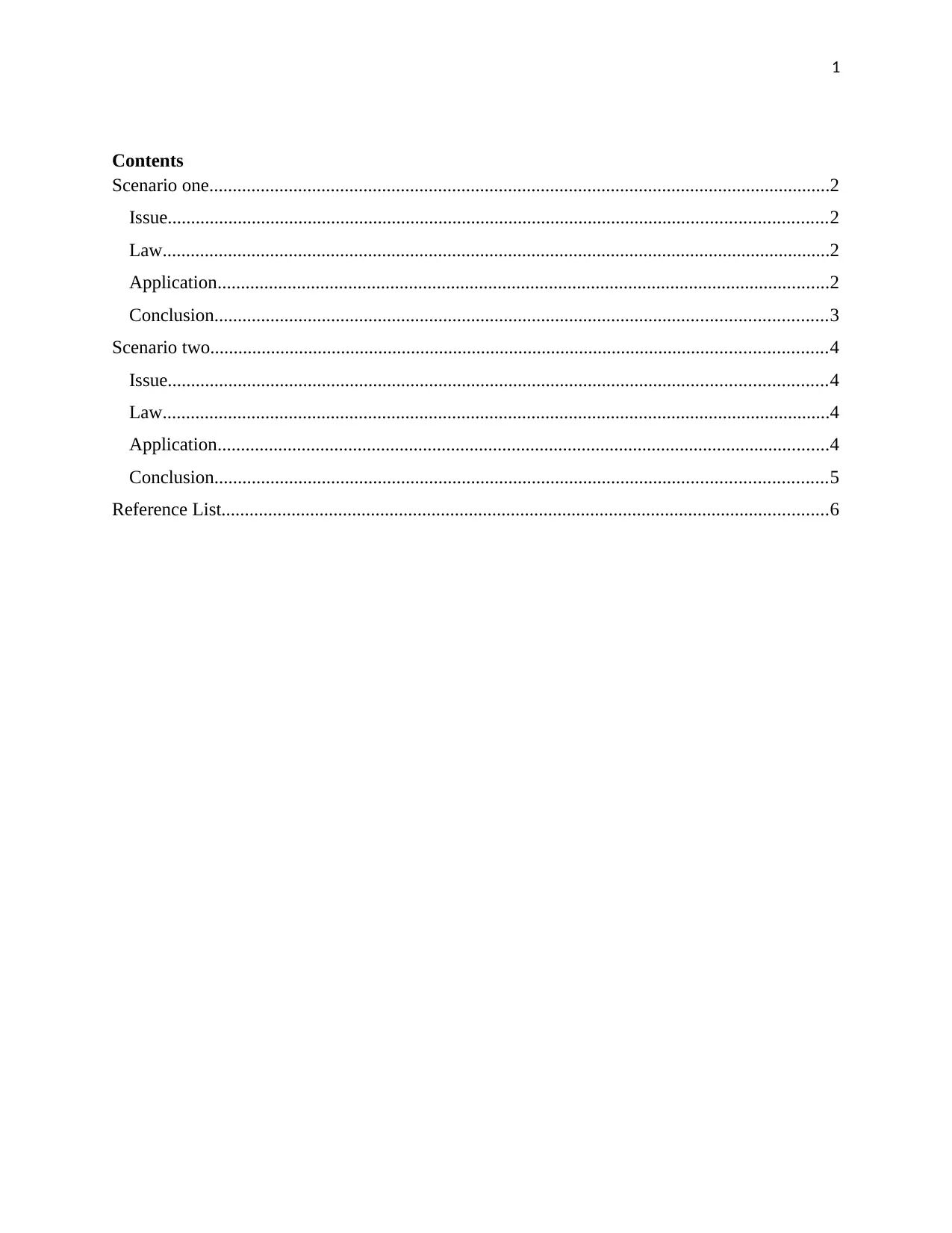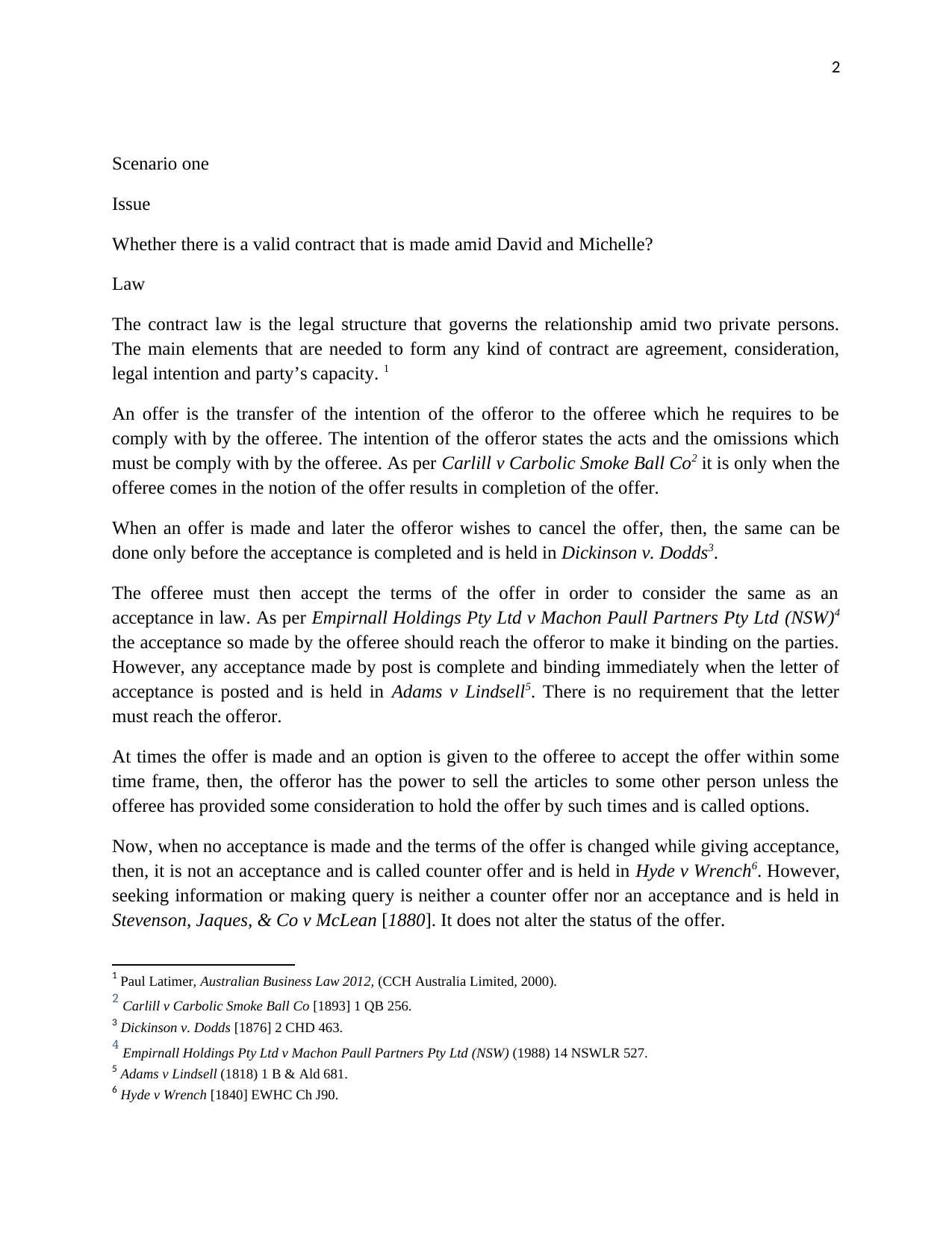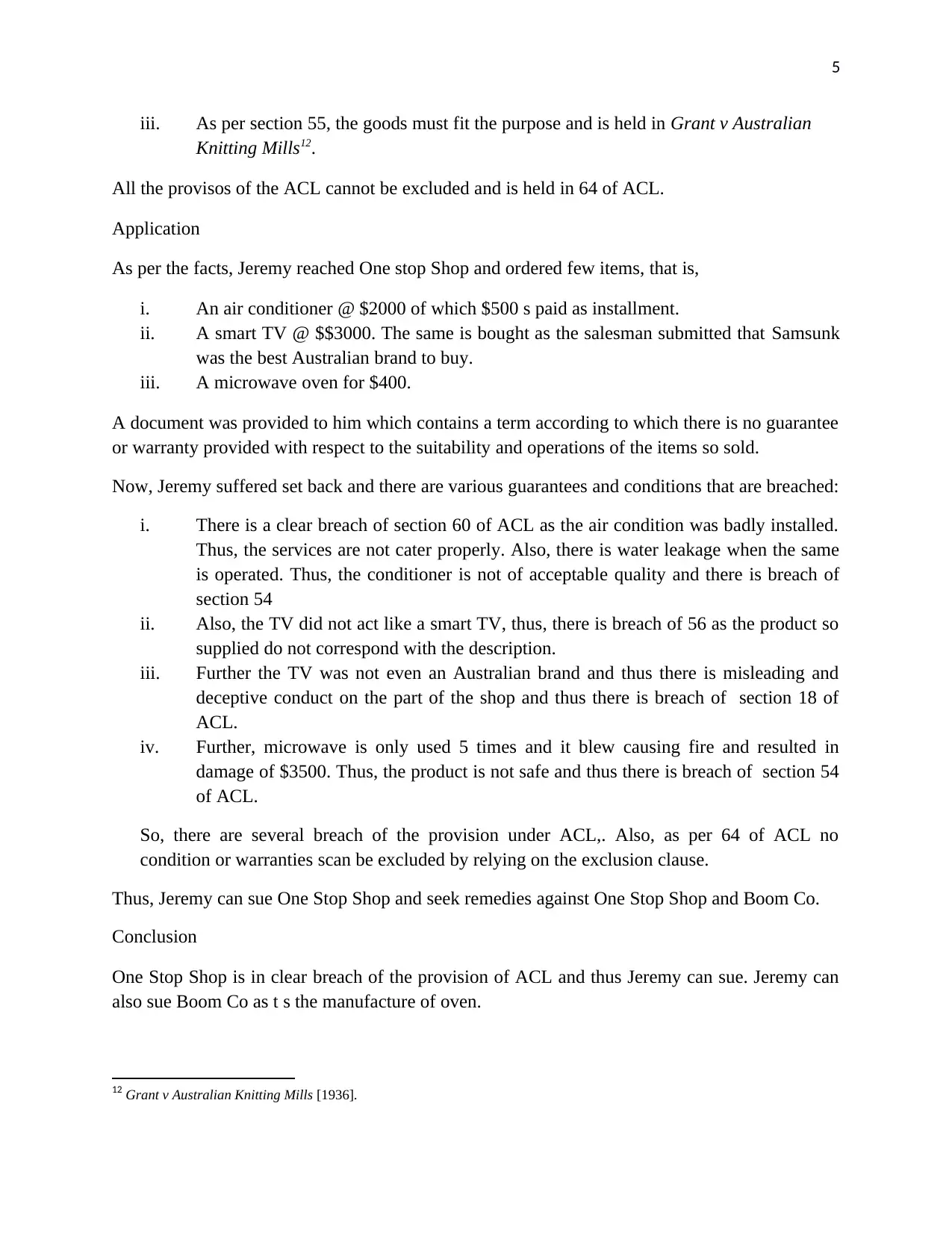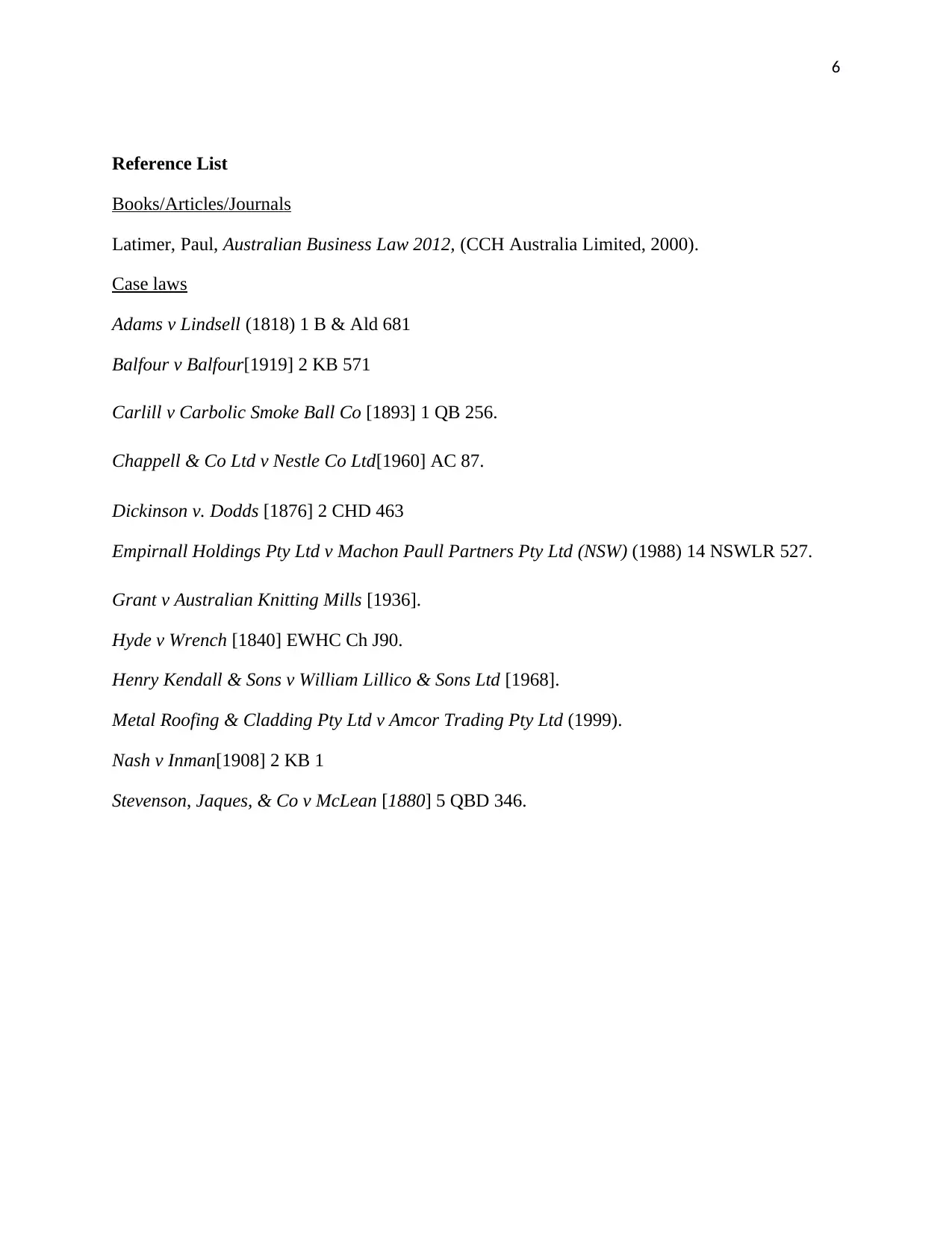Validity of Contract and Consumer Protection Laws
VerifiedAdded on 2023/01/18
|6
|2023
|36
AI Summary
This article discusses the validity of a contract between David and Michelle and the consumer protection laws applicable to Jeremy's case against One Stop Shop and Boom Co.
Contribute Materials
Your contribution can guide someone’s learning journey. Share your
documents today.

1
Contents
Scenario one.....................................................................................................................................2
Issue.............................................................................................................................................2
Law...............................................................................................................................................2
Application...................................................................................................................................2
Conclusion...................................................................................................................................3
Scenario two....................................................................................................................................4
Issue.............................................................................................................................................4
Law...............................................................................................................................................4
Application...................................................................................................................................4
Conclusion...................................................................................................................................5
Reference List..................................................................................................................................6
Contents
Scenario one.....................................................................................................................................2
Issue.............................................................................................................................................2
Law...............................................................................................................................................2
Application...................................................................................................................................2
Conclusion...................................................................................................................................3
Scenario two....................................................................................................................................4
Issue.............................................................................................................................................4
Law...............................................................................................................................................4
Application...................................................................................................................................4
Conclusion...................................................................................................................................5
Reference List..................................................................................................................................6
Secure Best Marks with AI Grader
Need help grading? Try our AI Grader for instant feedback on your assignments.

2
Scenario one
Issue
Whether there is a valid contract that is made amid David and Michelle?
Law
The contract law is the legal structure that governs the relationship amid two private persons.
The main elements that are needed to form any kind of contract are agreement, consideration,
legal intention and party’s capacity. 1
An offer is the transfer of the intention of the offeror to the offeree which he requires to be
comply with by the offeree. The intention of the offeror states the acts and the omissions which
must be comply with by the offeree. As per Carlill v Carbolic Smoke Ball Co2 it is only when the
offeree comes in the notion of the offer results in completion of the offer.
When an offer is made and later the offeror wishes to cancel the offer, then, the same can be
done only before the acceptance is completed and is held in Dickinson v. Dodds3.
The offeree must then accept the terms of the offer in order to consider the same as an
acceptance in law. As per Empirnall Holdings Pty Ltd v Machon Paull Partners Pty Ltd (NSW)4
the acceptance so made by the offeree should reach the offeror to make it binding on the parties.
However, any acceptance made by post is complete and binding immediately when the letter of
acceptance is posted and is held in Adams v Lindsell5. There is no requirement that the letter
must reach the offeror.
At times the offer is made and an option is given to the offeree to accept the offer within some
time frame, then, the offeror has the power to sell the articles to some other person unless the
offeree has provided some consideration to hold the offer by such times and is called options.
Now, when no acceptance is made and the terms of the offer is changed while giving acceptance,
then, it is not an acceptance and is called counter offer and is held in Hyde v Wrench6. However,
seeking information or making query is neither a counter offer nor an acceptance and is held in
Stevenson, Jaques, & Co v McLean [1880]. It does not alter the status of the offer.
1 Paul Latimer, Australian Business Law 2012, (CCH Australia Limited, 2000).
2 Carlill v Carbolic Smoke Ball Co [1893] 1 QB 256.
3 Dickinson v. Dodds [1876] 2 CHD 463.
4 Empirnall Holdings Pty Ltd v Machon Paull Partners Pty Ltd (NSW) (1988) 14 NSWLR 527.
5 Adams v Lindsell (1818) 1 B & Ald 681.
6 Hyde v Wrench [1840] EWHC Ch J90.
Scenario one
Issue
Whether there is a valid contract that is made amid David and Michelle?
Law
The contract law is the legal structure that governs the relationship amid two private persons.
The main elements that are needed to form any kind of contract are agreement, consideration,
legal intention and party’s capacity. 1
An offer is the transfer of the intention of the offeror to the offeree which he requires to be
comply with by the offeree. The intention of the offeror states the acts and the omissions which
must be comply with by the offeree. As per Carlill v Carbolic Smoke Ball Co2 it is only when the
offeree comes in the notion of the offer results in completion of the offer.
When an offer is made and later the offeror wishes to cancel the offer, then, the same can be
done only before the acceptance is completed and is held in Dickinson v. Dodds3.
The offeree must then accept the terms of the offer in order to consider the same as an
acceptance in law. As per Empirnall Holdings Pty Ltd v Machon Paull Partners Pty Ltd (NSW)4
the acceptance so made by the offeree should reach the offeror to make it binding on the parties.
However, any acceptance made by post is complete and binding immediately when the letter of
acceptance is posted and is held in Adams v Lindsell5. There is no requirement that the letter
must reach the offeror.
At times the offer is made and an option is given to the offeree to accept the offer within some
time frame, then, the offeror has the power to sell the articles to some other person unless the
offeree has provided some consideration to hold the offer by such times and is called options.
Now, when no acceptance is made and the terms of the offer is changed while giving acceptance,
then, it is not an acceptance and is called counter offer and is held in Hyde v Wrench6. However,
seeking information or making query is neither a counter offer nor an acceptance and is held in
Stevenson, Jaques, & Co v McLean [1880]. It does not alter the status of the offer.
1 Paul Latimer, Australian Business Law 2012, (CCH Australia Limited, 2000).
2 Carlill v Carbolic Smoke Ball Co [1893] 1 QB 256.
3 Dickinson v. Dodds [1876] 2 CHD 463.
4 Empirnall Holdings Pty Ltd v Machon Paull Partners Pty Ltd (NSW) (1988) 14 NSWLR 527.
5 Adams v Lindsell (1818) 1 B & Ald 681.
6 Hyde v Wrench [1840] EWHC Ch J90.

3
Further, when the offer and acceptance are made, then, an agreement is made. This agreement
must be combined with some gain called consideration. A consideration must be sufficient if not
absolute and is held in Chappell & Co Ltd v Nestle Co Ltd7. The parties must also have legal
intention as per Balfour v Balfour8 and must also have capacity as per Nash v Inman9.
Application
As per the facts, Michelle is studying veterinary surgeon. A close family friend, David, is also a
veterinary surgeon.
On 1st April, David sends a letter to Michelle and submitted that he is interested in selling his
veterinary equipments to Michelle for $5000. It was also submitted in the letter that if Michelle
is interested in buying the equipment, then, he must communicate his acceptance by 15th April as
Peter was also interested in buying the same equipment.
Now, David has sent an offer wherein he expressed his desire of selling his equipment to
Michele. As per Carlill v Carbolic Smoke Ball Co the offer letter has reached Michelle thus the
offer is complete. Now, the offer has been kept open till 15th April and Michelle has the choice to
accept the offer by that time.
But, David is not obligated to not to sell the equipment to someone else as there was no
consideration that has been moved from the side of Michelle to hold the offer till 15th April.
Now, when Michelle received the letter of David, then he was keen in buying the equipment
from David. On 2nd April he wrote a letter to David wherein he submitted his desire to buy the
equipment but also asked whether David would be interested in accepting the money in
installments. Now, at this point the acceptance that was sent by Michelle was valid as per Adams
v Lindsell. The acceptance was sent by post and it makes no difference that the letter got lost in
transit.
Also, the query of seeking that the payment can be made in installments is only an information
that s sought by Michelle and thus it did not alter any of the terms of the offer as per
Stevenson, Jaques, & Co v McLean.
Later when on 9th April, Michelle sent a letter along with the cheque $5000, then it will not alter
the position of Michelle or David as the contract was already formed when the acceptance letter
was send on 2nd April. On 9th April only the cheque was sent which was received by David on
17th April.
7 Chappell & Co Ltd v Nestle Co Ltd [1960] AC 87.
8 Balfour v Balfour [1919] 2 KB 571.
9 Nash v Inman [1908] 2 KB 1
Further, when the offer and acceptance are made, then, an agreement is made. This agreement
must be combined with some gain called consideration. A consideration must be sufficient if not
absolute and is held in Chappell & Co Ltd v Nestle Co Ltd7. The parties must also have legal
intention as per Balfour v Balfour8 and must also have capacity as per Nash v Inman9.
Application
As per the facts, Michelle is studying veterinary surgeon. A close family friend, David, is also a
veterinary surgeon.
On 1st April, David sends a letter to Michelle and submitted that he is interested in selling his
veterinary equipments to Michelle for $5000. It was also submitted in the letter that if Michelle
is interested in buying the equipment, then, he must communicate his acceptance by 15th April as
Peter was also interested in buying the same equipment.
Now, David has sent an offer wherein he expressed his desire of selling his equipment to
Michele. As per Carlill v Carbolic Smoke Ball Co the offer letter has reached Michelle thus the
offer is complete. Now, the offer has been kept open till 15th April and Michelle has the choice to
accept the offer by that time.
But, David is not obligated to not to sell the equipment to someone else as there was no
consideration that has been moved from the side of Michelle to hold the offer till 15th April.
Now, when Michelle received the letter of David, then he was keen in buying the equipment
from David. On 2nd April he wrote a letter to David wherein he submitted his desire to buy the
equipment but also asked whether David would be interested in accepting the money in
installments. Now, at this point the acceptance that was sent by Michelle was valid as per Adams
v Lindsell. The acceptance was sent by post and it makes no difference that the letter got lost in
transit.
Also, the query of seeking that the payment can be made in installments is only an information
that s sought by Michelle and thus it did not alter any of the terms of the offer as per
Stevenson, Jaques, & Co v McLean.
Later when on 9th April, Michelle sent a letter along with the cheque $5000, then it will not alter
the position of Michelle or David as the contract was already formed when the acceptance letter
was send on 2nd April. On 9th April only the cheque was sent which was received by David on
17th April.
7 Chappell & Co Ltd v Nestle Co Ltd [1960] AC 87.
8 Balfour v Balfour [1919] 2 KB 571.
9 Nash v Inman [1908] 2 KB 1

4
Now, David is under the obligation to not to sell the equipment to any other person. However, on
10th April, David changes his mind and sent an email to Michelle revoking his offer. However, as
per Dickinson v. Dodds an offer can only be revoked before the same is accepted. As per the
facts, the offer of David was accepted by Michelle on 2nd April through letter. Thus, the
revocation by David was made after the offer was accepted by Michelle.
Thus David cannot sell the equipment to Petrel.
Conclusion
There is a valid contract that is made amid David and Michelle when the letter of acceptance was
posted by Michelle on 2nd April.
Scenario two
Issue
Whether Jeremy can bring any action against One Stop Shop and Boom Co?
Law
In Australia, ACL was formulated in order to protect the interest of the consumers.
As per section 3, every person is a consumer who purchase the product for domestic use or when
the value of the product is not more than $3500. Also, the consumer can bought the action
against any manufacture or seller or importer under section 7 of ACL. (Latimer, 2012)
Every seller/manufacture must comply with certain provisions of ACL, that is:
i. As per section 18, no misleading or deceptive conduct must be taken while dealing in
the course of employment;
i. As per section 54 of the ACL, the goods so supplied must be of acceptable quality. As
per Henry Kendall & Sons v William Lillico & Sons Ltd10 if the goods so supplied are
not safe then they are not of acceptable quality;
ii. As per section 56 of ACL, the goods must match up with the description of the
products and is held in Metal Roofing & Cladding Pty Ltd v Amcor Trading Pty Ltd
11.
ii. As per 60 of ACL the seller of the products must cater the service of the product with
care an diligence.
10 Henry Kendall & Sons v William Lillico & Sons Ltd [1968].
11 Metal Roofing & Cladding Pty Ltd v Amcor Trading Pty Ltd (1999).
Now, David is under the obligation to not to sell the equipment to any other person. However, on
10th April, David changes his mind and sent an email to Michelle revoking his offer. However, as
per Dickinson v. Dodds an offer can only be revoked before the same is accepted. As per the
facts, the offer of David was accepted by Michelle on 2nd April through letter. Thus, the
revocation by David was made after the offer was accepted by Michelle.
Thus David cannot sell the equipment to Petrel.
Conclusion
There is a valid contract that is made amid David and Michelle when the letter of acceptance was
posted by Michelle on 2nd April.
Scenario two
Issue
Whether Jeremy can bring any action against One Stop Shop and Boom Co?
Law
In Australia, ACL was formulated in order to protect the interest of the consumers.
As per section 3, every person is a consumer who purchase the product for domestic use or when
the value of the product is not more than $3500. Also, the consumer can bought the action
against any manufacture or seller or importer under section 7 of ACL. (Latimer, 2012)
Every seller/manufacture must comply with certain provisions of ACL, that is:
i. As per section 18, no misleading or deceptive conduct must be taken while dealing in
the course of employment;
i. As per section 54 of the ACL, the goods so supplied must be of acceptable quality. As
per Henry Kendall & Sons v William Lillico & Sons Ltd10 if the goods so supplied are
not safe then they are not of acceptable quality;
ii. As per section 56 of ACL, the goods must match up with the description of the
products and is held in Metal Roofing & Cladding Pty Ltd v Amcor Trading Pty Ltd
11.
ii. As per 60 of ACL the seller of the products must cater the service of the product with
care an diligence.
10 Henry Kendall & Sons v William Lillico & Sons Ltd [1968].
11 Metal Roofing & Cladding Pty Ltd v Amcor Trading Pty Ltd (1999).
Secure Best Marks with AI Grader
Need help grading? Try our AI Grader for instant feedback on your assignments.

5
iii. As per section 55, the goods must fit the purpose and is held in Grant v Australian
Knitting Mills12.
All the provisos of the ACL cannot be excluded and is held in 64 of ACL.
Application
As per the facts, Jeremy reached One stop Shop and ordered few items, that is,
i. An air conditioner @ $2000 of which $500 s paid as installment.
ii. A smart TV @ $$3000. The same is bought as the salesman submitted that Samsunk
was the best Australian brand to buy.
iii. A microwave oven for $400.
A document was provided to him which contains a term according to which there is no guarantee
or warranty provided with respect to the suitability and operations of the items so sold.
Now, Jeremy suffered set back and there are various guarantees and conditions that are breached:
i. There is a clear breach of section 60 of ACL as the air condition was badly installed.
Thus, the services are not cater properly. Also, there is water leakage when the same
is operated. Thus, the conditioner is not of acceptable quality and there is breach of
section 54
ii. Also, the TV did not act like a smart TV, thus, there is breach of 56 as the product so
supplied do not correspond with the description.
iii. Further the TV was not even an Australian brand and thus there is misleading and
deceptive conduct on the part of the shop and thus there is breach of section 18 of
ACL.
iv. Further, microwave is only used 5 times and it blew causing fire and resulted in
damage of $3500. Thus, the product is not safe and thus there is breach of section 54
of ACL.
So, there are several breach of the provision under ACL,. Also, as per 64 of ACL no
condition or warranties scan be excluded by relying on the exclusion clause.
Thus, Jeremy can sue One Stop Shop and seek remedies against One Stop Shop and Boom Co.
Conclusion
One Stop Shop is in clear breach of the provision of ACL and thus Jeremy can sue. Jeremy can
also sue Boom Co as t s the manufacture of oven.
12 Grant v Australian Knitting Mills [1936].
iii. As per section 55, the goods must fit the purpose and is held in Grant v Australian
Knitting Mills12.
All the provisos of the ACL cannot be excluded and is held in 64 of ACL.
Application
As per the facts, Jeremy reached One stop Shop and ordered few items, that is,
i. An air conditioner @ $2000 of which $500 s paid as installment.
ii. A smart TV @ $$3000. The same is bought as the salesman submitted that Samsunk
was the best Australian brand to buy.
iii. A microwave oven for $400.
A document was provided to him which contains a term according to which there is no guarantee
or warranty provided with respect to the suitability and operations of the items so sold.
Now, Jeremy suffered set back and there are various guarantees and conditions that are breached:
i. There is a clear breach of section 60 of ACL as the air condition was badly installed.
Thus, the services are not cater properly. Also, there is water leakage when the same
is operated. Thus, the conditioner is not of acceptable quality and there is breach of
section 54
ii. Also, the TV did not act like a smart TV, thus, there is breach of 56 as the product so
supplied do not correspond with the description.
iii. Further the TV was not even an Australian brand and thus there is misleading and
deceptive conduct on the part of the shop and thus there is breach of section 18 of
ACL.
iv. Further, microwave is only used 5 times and it blew causing fire and resulted in
damage of $3500. Thus, the product is not safe and thus there is breach of section 54
of ACL.
So, there are several breach of the provision under ACL,. Also, as per 64 of ACL no
condition or warranties scan be excluded by relying on the exclusion clause.
Thus, Jeremy can sue One Stop Shop and seek remedies against One Stop Shop and Boom Co.
Conclusion
One Stop Shop is in clear breach of the provision of ACL and thus Jeremy can sue. Jeremy can
also sue Boom Co as t s the manufacture of oven.
12 Grant v Australian Knitting Mills [1936].

6
Reference List
Books/Articles/Journals
Latimer, Paul, Australian Business Law 2012, (CCH Australia Limited, 2000).
Case laws
Adams v Lindsell (1818) 1 B & Ald 681
Balfour v Balfour[1919] 2 KB 571
Carlill v Carbolic Smoke Ball Co [1893] 1 QB 256.
Chappell & Co Ltd v Nestle Co Ltd[1960] AC 87.
Dickinson v. Dodds [1876] 2 CHD 463
Empirnall Holdings Pty Ltd v Machon Paull Partners Pty Ltd (NSW) (1988) 14 NSWLR 527.
Grant v Australian Knitting Mills [1936].
Hyde v Wrench [1840] EWHC Ch J90.
Henry Kendall & Sons v William Lillico & Sons Ltd [1968].
Metal Roofing & Cladding Pty Ltd v Amcor Trading Pty Ltd (1999).
Nash v Inman[1908] 2 KB 1
Stevenson, Jaques, & Co v McLean [1880] 5 QBD 346.
Reference List
Books/Articles/Journals
Latimer, Paul, Australian Business Law 2012, (CCH Australia Limited, 2000).
Case laws
Adams v Lindsell (1818) 1 B & Ald 681
Balfour v Balfour[1919] 2 KB 571
Carlill v Carbolic Smoke Ball Co [1893] 1 QB 256.
Chappell & Co Ltd v Nestle Co Ltd[1960] AC 87.
Dickinson v. Dodds [1876] 2 CHD 463
Empirnall Holdings Pty Ltd v Machon Paull Partners Pty Ltd (NSW) (1988) 14 NSWLR 527.
Grant v Australian Knitting Mills [1936].
Hyde v Wrench [1840] EWHC Ch J90.
Henry Kendall & Sons v William Lillico & Sons Ltd [1968].
Metal Roofing & Cladding Pty Ltd v Amcor Trading Pty Ltd (1999).
Nash v Inman[1908] 2 KB 1
Stevenson, Jaques, & Co v McLean [1880] 5 QBD 346.
1 out of 6
Your All-in-One AI-Powered Toolkit for Academic Success.
+13062052269
info@desklib.com
Available 24*7 on WhatsApp / Email
![[object Object]](/_next/static/media/star-bottom.7253800d.svg)
Unlock your academic potential
© 2024 | Zucol Services PVT LTD | All rights reserved.




